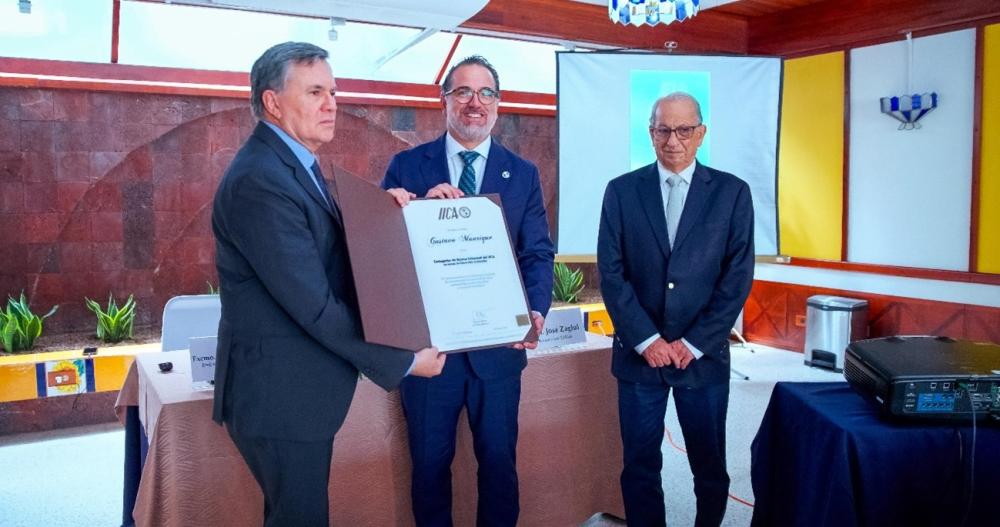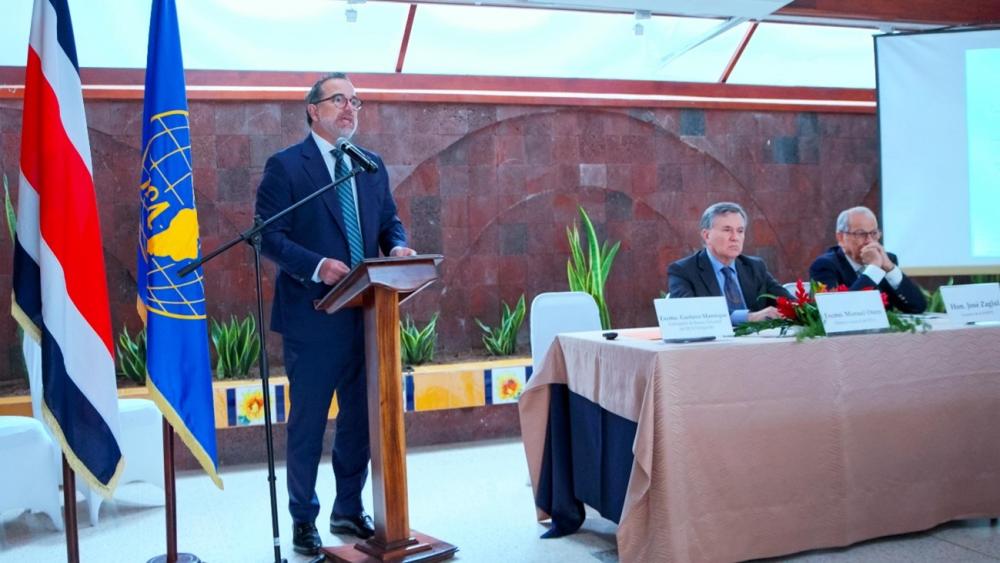Ecuadorian Gustavo Manrique, the architect of the world’s biggest debt-for-nature swap, is IICA’s latest Goodwill Ambassador

San José, 23 October 2024 (IICA). The Inter-American Institute for Cooperation on Agriculture (IICA) held a ceremony to mark the appointment of Gustavo Manrique, former Minister of Foreign Affairs and Minister of Environment of Ecuador, as its Goodwill Ambassador for biodiversity, climate action and the ecological transition. The participants in the activity included the Director General of the specialized agency for agriculture and rural development, Manuel Otero, and the former rector of EARTH University, José Zaglul.
Having worked in the field of sustainability for more than 25 years, it was while serving as his country’s foreign minister that Manrique played a key role in negotiating the world’s biggest debt-for-nature swap to date. The initiative allowed Ecuador to allocate resources for long-term marine conservation in the Galapagos Islands, thereby promoting greater sustainability and improving the quality of life of Ecuadorians.
“Here we have a true leader, a combination of entrepreneur, businessman and political leader who is an eloquent advocate of the idea that biodiversity is our main capital and that we must use it to promote much more sustainable and resilient agricultural models,” said Manuel Otero at the ceremony held to mark the appointment of IICA’s latest ambassador.
“This appointment is a clear example of how EARTH University contributes to the training of the new generation of human resources needed on our continent to strengthen our profile as a guarantor of food security and environmental sustainability,” he added.
José Zaglul, a respected academic and Manrique’s mentor, commented that “in Gustavo Manrique we have a case of a disciple surpassing his teacher, a man whose innovative vision of agriculture strengthens the concept of agriculture at the service of peace.”
Upon receiving the diploma accrediting him as an IICA Goodwill Ambassador from the Director General, Manrique described the accolade as “a great honor” and spoke of how humanity is currently facing a threefold global crisis. The loss of biodiversity, pollution and climate change are three interrelated challenges that feed into each other, putting the balance of the planet and our own survival at risk.
“In fact,” he said, “the planet is not at risk; it is the human species that is at risk. If the planet disappears, human beings disappear, but if human beings disappear, the planet will recover. We already saw this during the pandemic. Measures are urgently needed to address this crisis and achieve a balance between human development and environmental protection.”
The debt-for-nature swap model – which allows developing countries to reduce severe constraints on their economies in exchange for conserving ecosystems for the benefit of the entire planet – has charted a course that other countries in the region and around the world can follow.
“Gross Domestic Product (GDP) has traditionally been used as the main indicator of a country’s economic success, but this approach fails to consider the environmental and social costs associated with growth. According to this metric, a country’s success is measured by its capacity to produce and consume, without taking into account the irreparable damage caused to ecosystems and human health.
This model has encouraged the overexploitation of natural resources, contributing to the loss of biodiversity, pollution and climate change,” he added.
IICA’s Goodwill Ambassadors share the Institute’s commitment to achieving sustainable and equitable development. They also take on the challenges of supporting causes whose aim is to raise public awareness of the importance of food and nutrition security, and of working for development through projects related to the bioeconomy, gender and youth relations and responsible production, all of which are key issues on IICA’s agenda.
Manrique pledged to represent IICA “in all aspects of its mission,” underlining the Institute’s crucial role in the agricultural and rural development of Latin America and the Caribbean.

Replicable model
Ecuador’s groundbreaking debt-for-nature swap is especially useful for the Latin American and Caribbean countries, which have ecosystem services that need to be restored or cared for, and which are part of humanity’s heritage.
In the specific case promoted by Manrique, Ecuador created a marine protected area in the Galapagos Islands and reduced its sovereign debt by more than USD 1.1 billion, thereby benefiting 18 million Ecuadorians. A further donation of more than USD 450 million spread over 18 years has also provided a mechanism for conserving the islands in perpetuity. The total amount involved, USD 1.659 billion, was the biggest debt-for-nature swap in history.
“Latin America and the Caribbean’s new credentials are not based on a carbon-based economy, but on our biodiversity, our culture, agriculture and renewable energy. This is our great challenge and our opportunity: for the world to recognize and pay for what Latin America and the Caribbean provide. Together, we can lead a transition towards an economy that benefits our planet and our communities,” Manrique said upon receiving his diploma.
“It is time to unite as a region, to take advantage of our decision-making capacity and spark real change,” he added.
An agricultural engineer by profession, Manrique was appointed foreign minister in 2023 after serving as Minister for Environment, Water and the Ecological Transition for two years. During a successful career with agricultural and socio-environmental enterprises, he has served as a consultant on more than 2000 environmental projects.
IICA’s new Goodwill Ambassador was also one of the creators of the Premios Latinoamérica Verde, which are awarded to environmental projects and designed to strengthen them and contribute to their long-term continuity. IICA is a strategic partner of the initiative, which aims to support projects linked to, among other activities, sustainable agriculture and tourism, which often fail within the first two years due to a lack of strategic planning, contacts and financial resources.
In ten years, 71,000 projects have been nominated for the awards, 71% of which are still in operation, benefiting the planet.
In 2018, Manrique himself was a finalist for “The Catalyst Awards,” which recognize innovation and excellence, and in 2020 was rated one of the 100 most influential leaders on climate change in Latin America. He is also a member of the World Economic Forum’s Champions for Nature community.
The Ambassadors
IICA’s Goodwill Ambassadors are: Enrique Iglesias (former head of the Ibero-American General Secretariat and former President of the Inter-American Development Bank, IDB); Maris Llorens (livestock entrepreneur and philanthropist); Keithlin Caroo (founder and Executive Director of Helen’s Daughters); Hipólito Mejía Domínguez (former President of the Dominican Republic); Rattan Lal (winner of the 2020 World Food Prize); Michael Kremer (winner of the 2019 Nobel Prize in the Economic Sciences); Hugo Sigman (Argentine psychiatrist and businessman, founder of the Grupo Insud); Beatriz Paredes (Mexican Senator); Jens Mesa Dishington (agricultural economist and a driving force behind the modernization of Colombia’s agriculture sector); Susana Balbo (Argentina’s first female winemaker, who has run her own winery, Susana Balbo Wines, since 1999); Dennis McClung (founder, President and Executive Director of Garden Pool); Cynthia Rosenzweig (world-renowned scientist, expert on the relationship between agriculture and climate change) and Joachim von Braun (Professor of Economics and Technological Change at the University of Bonn, Germany).
The 2006 World Food Prize laureate and former Minister of Agriculture of Brazil, Alysson Paolinelli, who died last year, was also an IICA Goodwill Ambassador.
More information:
Institutional Communication Division.
comunicacion.institucional@iica.int